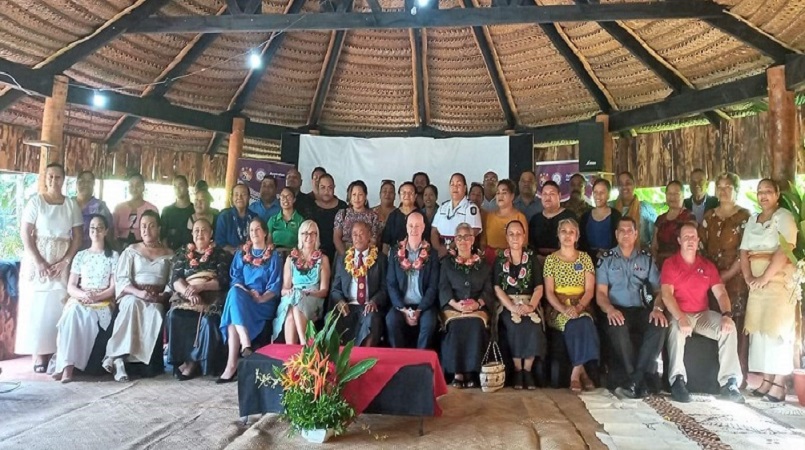
Survivors of domestic violence (DV) or gender-based violence (GBV) can now access justice with more comprehensive legal support provided online by the Tonga Family Protection Legal Aid Centre (FPLAC).
The online portal with a mobile app, launched this week will enable survivors to obtain information on relevant laws and mechanism, establish safety plans and report family violence directly to FPLAC. The development of the online system for the legal aid services was made possible through the support from the UN Development Programme (UNDP).
The digital platform will allow FPLAC officers to reach out to potential clients and provide remote legal counsels and referrals to other service providers within the National Referral Network, in line with the National Service Delivery Protocol. This will be one of the first integrated legal aid services provided on digital platforms for DV and GBV survivors globally.
Survivors will also be able to do so remotely, without the need to travel to and from the FPLAC office located in Nukuʻalofa, the capital of Tonga on the main island of Tongatapu, hundreds of kilometres and long boat rides away from the other major Tongan island groups. The online system ensures that they can access online legal services completely anonymously and safely, which is critically important given the stigma many survivors fear.
Globally, it has been observed that in the aftermath of disasters, violence against women spikes, while COVID-19 has likewise seen significant increases in rates of violence, with dangers enhanced due to movement restrictions. Although Tonga has mostly been free from the COVID-19 health crisis, in relation to the preventive measures such as border closure, negative social and economic impact have been felt by citizens, which sometimes revealed underlying unequal gendered power relations in a violent form.
The UNDP Human Development Reports show that more than one in three Tongan women experienced violence by intimate partner (39.6 percent). It has been observed by FPLAC that despite strong interest in FPLAC services, stigma in local communities often prevented women from requesting information and direct assistance.
To assist in bridging gaps in access to information, documentation and to help overcome the challenge of community level stigma, UNDP has been supporting FPLAC in developing and launching an online initiative, establishing an online legal information portal and self-help mobile app, including a family violence reporting tool.
Samiu Vaipulu, Minister of Justice officially launched the online portal saying that the digital platform marked a ground-breaking step forward for DV and GBV survivors to access justice as stipulated in the Family Protection Act 2013 which says domestic violence is a crime.
“Through the online platform and the mobile app, survivors will have access to legal information and counsels without compromising the protection of confidentiality of the cases, without being known to the perpetrators and others, regardless of their personal circumstances. Based on the knowledge and support available to them, they will be able to make their own safety plans, access justice and move forward,” said Vaipulu.
The FPLAC, established in 2018 as the first of its kind in the Pacific, provides legal aid services specifically to assist survivors of family violence, DV and SGBV in particular. Since its initial pilot stage under the Ministry of Justice as a joint initiative with the Pacific Community (SPC) through its SPC Human Rights and Social Development Division (HRSD), FPLAC has significantly expanded its capacity for awareness raising and service delivery to remote communities in Tonga.
FPLAC participated in the Rights, Empowerment and Cohesion Programme (REACH) mobile service delivery programme coordinated by UNDP in partnership with UN Women as a pilot, with funding from the Australian Government. Through the REACH integrated service delivery platform, FPLAC officers travelled with government and civil society organizations as a team to remote communities, conducted awareness raising programmes and delivered services directly to community members at their doorsteps, including remote island communities in Vava’u, ‘Eua and Ha’apai.
Through the community outreach activities and the newly launched digital platform, survivor-centred legal services will be more accessible online.
Levan Bouadze, Resident Representative of UNDP Pacific Office in Fiji joined the online launch ceremony and said, “The pandemic, while it posed serious challenges in many aspects of our society, urged us to innovate to overcome and build back better by reaching out to vulnerable groups and make the systems more inclusive. The digital platform for comprehensive legal aid services to protect domestic violence and gender-based violence survivors is an exemplary initiative taken by the Centre.”
The FPLAC digital justice support initiative is based on the earlier study which presented that Tonga’s outer islands have relatively good internet coverage and women in communities have been strong mobile smartphone users. However, being aware of the digital gap and divide marginalized groups are experiencing, the FPLAC continues strengthening its physical outreach through the REACH mobile integrated service delivery platform, while advocating for policies and programmes that aim to make technology more accessible to marginalized groups.
Minister acknowledged UNDP and the Family Free of Violence Programme for the tremendous support towards the development of this digital platform and also the Government of Australia for its support towards the training and awareness programme that will roll out throughout Tonga in the next few months.
Photo supplied
